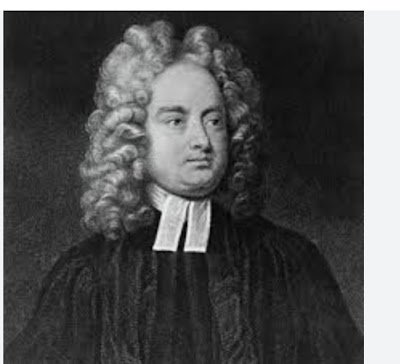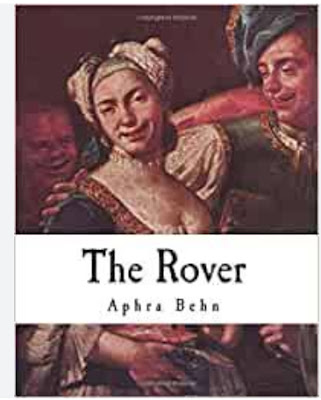Name- Hinaba D Sarvaiya.
Roll no- 09
Paper no- 101 Literature of the Elizabethan and Restoration
Email id- hinabasarvaiya1711@gmail.com
Enrollment no- 4069206420210032
Submitted to- Department of English MKBU.
Write a note on the chief characteristics of Restoration Comedy. Exemplify 'The Rover' as the Restoration Comedy.
Introduction:-
The Rover or The Banished Cavaliers is a play in two parts that is written by the English author Aphra Behn. It is a revision of Thomas Killigrew's play Thomaso, or The Wanderer in 1664, and features multiple plot lines, dealing with the amorous adventures of a group of Englishmen and women in Naples at Carnival time.
Let's discuss about the author:-
Aphra Behn's:-
Aphra Benh was an English playwright, poet, translator and fiction writer from the Restoration period. As one of the first English women to Eran her living by her writing, she broke cultural barriers and served as a literary role model for later generations of women author. Rising from obscurity, she came to the notic of Charles II, who employed her as a spy in Antwerp. Upon her return to London and probable brief stay in debtor's prison, she began writing for the stage. She wrote under the pastoral pseudonym Astrea. She writes very famous works.
Notable works:-
1). The Rover(1677-81)
2).Oroonoko(1688)
3).Love-Letters Between a Nobleman and His Sister(1684-87)
4).The Fair Jilt(1688) ect..
Characteristics of The Restoration Comedy:-
-This type of dramas ridicule the manners and behaviours of the upper class or the Aristocratic Society.
-Comedy of manners is a style of dramatic comedy that reflects the life, ideals and manners of the upper class society.
-It depicts the relationships and intrigues of men and women belonging to polished section of society.
- Display of witty, blunt sexual dialogue, rakish behaviour.
-Characters are driven by Lust, greed and revenge, and their goals are limited: courtship, gulling, Cuckoldry.
-Dramatists who practised this form of comedy are William Congreve, George Etherege, William Wycherley and Aphra Behn.
Let's discuss about the The Rover as the Restoration Comedy:-
In The Rover two characters Florinda and Hellena we have the stock figures of the Aristocratic virgin and the witty heroine, respectively. Florinda is afraid to outright rebel against her brother and has to resort to entering the carnival to achieve her desires. She is aware of the value of her virginity and protects it to the very end to present to her beloved in marriage.
Hellena's wit is a significant tool for setting up the battle of the wits. With her intellect, she becomes the sole match for Willmore, who despite his Casanova nature is drawn repeatedly to her.
The Rover women, Hellena fares best because, although she is Lustful, her power is based not in her sexuality but in her wit for adventure. Florinda and Hellena both lady and many other characters in the play Legitimacy from the institution of marriage.
Women are almost always at the receiving end in Behn's play, especially since Restoration Literature sought to be realistic. Women fight against restrictive norms mirrors her own sense of Agency.
Angelica act of gifting her sexuality as well as money to "disappointed in love or fortune". The rich prostitution without chastity and modesty, thinks it is her privilege to seduce whomsoever she fancies.
Behn's radical awareness of the double standards of morality, by whichen and women are enjoyed to live. Angelica points out that men effectively prostitute themselves in the marriage market. When thay marry a woman for her money and not for love. She tries to claim equal status with the men by using her sex as her power.
Willmore, much like the model set by Charles II himself, imitated enthusiastic in many Restoration texts. His evil is more a blind spot than active malice. Willmore lives completely in the present tense. This frees him from the dominant motivations of greed and politics which Behn loathes in social relations. Wilmore roves outside the conventional Restoration fears of Cuckoldry and material poverty.
The two Rovers, Willmore, Hellena, share the same propensities, both are Frank about their temperaments. Hellena's attitude to female sexuality is as natural as that of willmore. She is natural urge to have a man who she likes. Willmore is undoubtedly the rakish hero, a Cavalier, but it is Hellena who seems to be the real rover in the play. Behn wants to crown her with success in her revolt against the father's decision to confine her to a life of nunnery.
Crisis in the Aristocracy, of which Pedro's character is a function is also turned on its head by his ultimate acceptance of Florinda and Belvile's marriage.
Blunt Initially seems to be purely a stock figures one often found in Restoration comedies. He is an English country gentlemen, rich but foolish. His attempts at projecting himself as wit evoke much laughter from the reader.
End of the play the prostitution returning to her trade, and the virgins being awarded with marriage a proverbial 'happy ending'. The carnival, Behn gives space to her characters to explore their true nature, albeit behind masks representation that focuses upon serious issues of freedom, identity and physicality, particularly with respect to women.
Symbols in the play:-
Carnival:-
Italian cities such as Venice and Naples were famed for their Carnivals, huge, citywide festivals. Carnival Symbolises in world of inverted values and freedom in which noblewomen can roam the streets and impoverished Cavaliers can court them and win their hands. Hellena and Florinda also go to the carnival and hidden your identity. Willmore and Blunt take advantage of the free atmosphere and assault women. In depicting both the positive and dark side of Carnival. Behn is displaying both the comic and troubling aspects of the topsy-turvy, consequence free genre of Restoration Comedy.
Masks:-
Hellena, Florinda, and the Cavaliers all use masks and disguises in order to play and carry out their identity. Willmore and Hellena fall in love without even knowing each other's names. Belvile, meanwhile, repeatedly does not recognise Florinda even when she is right in front of him. Mask symbolise the hidden identity and reality.
Angelica's Picture:-
Anglica is a rich prostitude. She always commands her servants to display picture of herself in front of her house, so all the citizen of Naples can admire her beauty. These picture represent not only her vanity, but also her sence of self. Women Beauty are attached in men and he also fulfilled his desire. Here the centre of women beauty.
Sword:-
Throughout The Rover, sword are associated with masculinity, virility, and power. Belvile is a true man in part because of his skill with a sword. Much of Blunt's humiliation comes from being robbed of his sword, and then being forced to wear a rusty one. Don Pedro draw their swords and much is made of the fact that Pedro Spanish blade is longer than their English swords. Willmore in particular, often uses swordplay as a metaphor for intercourse. Behn takes care to show the consequences of such a belligerent and dangerous atmosphere.
Characters in The Rover:-
Colonel Belvile:-
Belvile is an English colonel who is madly in love with Florinda, a Spanish noblewoman that he met at a siege in Pamplona, where he protected her from danger. He is a generally calm and level-headed man prepared to do nearly anything to be with Florinda. He is sad at the beginning of the play because his prospects of marrying Florinda are grim; he is a poor foreigner competing with a wealthy friend of the family for Florinda’s hand in marriage. However, Belvile remains loyal to Florinda throughout the entirety of the play, and eventually marries her against the wishes of her brother, Pedro (however, Belvile eventually secures his blessing). Florinda is deeply in love with Belvile.
Florinda:-
Florinda, sister of Hellena and Don Pedro, is a Spanish noblewoman who has been ordered by her father to marry Don Vincentio, a wealthy, old Spanish man. She is outspoken and stubborn, and refuses outright to marry Don Vincentio, whom she hates. Florinda also refuses to marry Don Antonio, the good friend of her brother, Pedro. She is madly in love with Colonel Belvile, an Englishman whom she met in Pamplona, and resolves to marry no one else but him. Florinda is a confident, independent, and stubborn woman. Though not as outspoken as her sister, Hellena, she is nevertheless a very determined woman.
Willmore:-
Willmore is “The Rover”; he is a man who spends most of his days at sea, moving from place to place without fixed route or destination. It is implied that Charles II is onboard the ship that Willmore captains, which indicates that Willmore is a royalist. Throughout the play he is an inconstant character, committing to one woman, and then moving on to the next moments later. His disloyal character is thus emphasized via his interaction with the women that he encounters throughout the course of the play. He is also a notably hotheaded and rash character, always quick to draw his sword.
Hellena:-
sister of Florinda and Pedro, is a Spanish noblewoman and prospective nun. She is an outspoken, confident, and curious young woman set on making her own decisions. She is very critical of religion and the path that has been chosen for her by her father and brother. Of all the characters, she is most cunning, clever, and boldly defiant. Hellena sets her sights on Willmore, and eventually convinces him to marry her.













